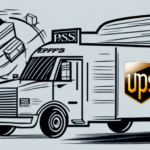Understanding UPS Shipping Rates to Thailand
If you need to send packages to Thailand, UPS is a reliable and popular choice. In this article, we'll take an in-depth look at UPS shipping rates to Thailand, the factors that affect these rates, ways to reduce your shipping costs, and how to track and manage your shipments with UPS.
Why UPS is a Great Shipping Option for Thailand
UPS is a major global shipping company that operates in over 220 countries worldwide. They have a strong presence in Thailand, with multiple facilities across the country and a wide range of shipping services to choose from. Some of the benefits of using UPS for shipping to Thailand include:
- Reliability: UPS boasts a delivery success rate of over 99%, ensuring your packages arrive on time and in good condition.
- Flexibility: UPS offers a variety of shipping options, including express delivery, standard delivery, and freight services, catering to both urgent and budget shipments.
- Customs Expertise: With extensive experience in handling international shipments, UPS efficiently navigates Thailand's customs regulations, reducing the risk of delays and ensuring compliance.
In addition to these benefits, UPS offers competitive pricing for shipping to Thailand. According to the latest [UPS Rate Comparison](https://www.ups.com/us/en/help-center/rates.page), their pricing options cater to different budgets and shipping needs, making them a great choice for both businesses and individuals.
Another advantage of using UPS for shipping to Thailand is their advanced tracking system. Customers can easily track their packages in real-time, from the moment they are picked up to the moment they are delivered. This provides peace of mind and allows for better planning and coordination of shipments.
How to Calculate UPS Shipping Rates to Thailand
The cost of shipping with UPS to Thailand depends on several factors, including:
- The weight and dimensions of your package.
- The shipping origin and destination.
- The shipping speed you choose (e.g., express or standard).
- The type of package (e.g., envelope, box, or pallet).
The easiest way to calculate UPS shipping rates to Thailand is to use the UPS shipping calculator on their website. This tool will ask for information about your shipment and provide an estimated cost based on UPS's current rates. According to [UPS Shipping Rates 2023](https://www.ups.com/us/en/services/shipping.page), their calculator is regularly updated to reflect the latest pricing.
It's important to note that UPS also offers additional services that can affect the cost of shipping to Thailand. For example, if you require signature confirmation or insurance for your package, these services will add to the overall cost. Additionally, if you are shipping items that are considered hazardous materials, there may be additional fees and restrictions.
Before shipping with UPS to Thailand, it's a good idea to research any customs regulations and requirements. Depending on the contents of your package, you may need to provide additional documentation or pay import taxes and fees. UPS can provide guidance on these matters, but it's ultimately the responsibility of the shipper to ensure compliance with all relevant laws and regulations. Refer to the [Thailand Customs](https://www.customs.go.th/) website for the most up-to-date information.
Factors that Affect Your UPS Shipping Rates to Thailand
Several factors can influence the cost of shipping with UPS to Thailand:
- Distance: The farther your package needs to travel, the higher the shipping cost.
- Weight and Size: Heavier and larger packages incur higher shipping fees.
- Shipping Speed: Express delivery services are generally more expensive than standard delivery.
- Customs Fees: If your package is subject to customs duties or taxes, these costs will be added to the overall shipping fee.
Understanding these factors is crucial when calculating your UPS shipping rates to Thailand, as they can significantly impact your total shipping costs. According to [UPS Shipping Factors 2023](https://www.ups.com/us/en/services/shipping.page), being aware of these elements can help you better estimate and manage your shipping expenses.
Additionally, the type of item you are shipping can affect your shipping rates. Some items may be classified as hazardous or restricted, leading to higher costs or even prohibiting the shipment altogether.
The time of year also plays a role in shipping rates. During peak holiday seasons, shipping rates may increase due to higher demand and limited shipping capacity.
Tips for Reducing Your UPS Shipping Costs to Thailand
If you're aiming to save money on shipping with UPS to Thailand, consider the following strategies:
- Package Consolidation: Combine multiple items into a single package to reduce overall weight and size.
- Choose Standard Shipping: Opt for standard delivery if your package isn't time-sensitive, as it is less expensive than express options.
- Compare Shipping Rates: Shop around to find the best rates and consider using a shipping broker or aggregator to access discounted pricing.
- Pack Items Carefully: Proper packing minimizes the risk of damage, potentially saving costs related to insurance and handling.
Another effective strategy is to use UPS's flat rate boxes. These boxes come in various sizes and offer a cost-effective option for shipping items that fit within their dimensions. Additionally, printing your shipping labels at home instead of at a UPS store can save both time and money by allowing you to skip lines and quickly drop off your package at a UPS location.
Understanding the Different Types of UPS Shipping Services Available in Thailand
UPS provides a variety of shipping services in Thailand to meet diverse customer needs:
- UPS Express: A fast and reliable delivery service that guarantees delivery within a specific timeframe.
- UPS Standard: An affordable option offering reliable delivery within 3-5 business days.
- UPS Worldwide Express Freight: A specialized service for shipping large or heavy items.
- UPS Worldwide Expedited: A mid-range service that offers faster delivery than standard shipping at a lower cost than express shipping.
Choosing the right shipping service allows you to balance cost, speed, and reliability, ensuring your package arrives safely and on time.
Moreover, UPS offers additional services such as package tracking, insurance, and customs clearance assistance. With package tracking, you can monitor your shipment's progress and receive delivery updates. Insurance provides added protection for valuable or fragile items during transit. For international shipments, customs clearance assistance ensures that your package meets all necessary regulations and requirements.
How to Pack Your Shipment for Safe and Efficient UPS Delivery to Thailand
Proper packaging is essential to ensure your items arrive safely and securely:
- Choose the Right Packaging Materials: Use sturdy boxes, bubble wrap, and high-quality packing tape to protect your items.
- Fill Empty Space: Use packing peanuts or other filler materials to prevent items from shifting during transport.
- Label Your Package Clearly: Include the correct shipping address, return address, and any necessary customs documentation.
By taking the time to pack your shipment carefully, you minimize the risk of damage or loss during transit.
Additionally, consider the weight and size of your shipment when packing for UPS delivery to Thailand. UPS has specific weight and size restrictions for international shipments, so be sure to check their packaging guidelines before packing. If you're shipping fragile or valuable items, purchasing additional insurance can provide extra protection against unforeseen circumstances.
Common Challenges You May Encounter When Shipping with UPS to Thailand
Shipping internationally with UPS to Thailand can present several challenges:
- Customs Delays: Packages may be held up in customs for inspection, leading to delayed delivery times.
- Customs Fees: Additional fees for customs duties, taxes, or brokerage services may apply.
- Language Barriers: Communication with Thai customs officials or shipping representatives might be challenging if you don't speak Thai.
- Local Regulations: Different regions of Thailand may have their own regulations for shipping and receiving packages, so it's important to research these before sending your shipment.
By being aware of these potential issues and taking proactive steps, you can help ensure a smooth and successful shipment with UPS to Thailand.
Another challenge is the weather in Thailand, which experiences a tropical climate. Extreme weather conditions such as heavy rain and flooding can cause delays in delivery times and damage to packages. It's advisable to factor in potential weather-related delays when planning your shipments.
Additionally, understanding cultural differences is important when shipping to Thailand. Thai culture emphasizes respect and politeness, so ensure that your packaging and labeling are appropriate and respectful. Be mindful of Thai holidays and customs, as these can affect delivery times and the availability of shipping services.
How to Track and Manage Your UPS Shipments to Thailand
Tracking your shipment is crucial to stay informed about its progress and ensure timely delivery. UPS offers several tools for tracking and managing your shipments:
- UPS Tracking: An online tool that allows you to track the status of your shipment in real-time, from pickup to delivery.
- UPS My Choice: A free account that enables you to manage your shipments, specify delivery preferences, and receive notifications about your package's progress.
- UPS Mobile App: An app that allows you to track your shipment from your mobile device, receive delivery alerts, and even authorize shipments for release.
Utilizing these tools ensures that you stay updated on the status of your shipment, helping you manage delivery expectations effectively.
Moreover, it's important to be aware of Thailand's customs regulations and fees that may apply to your shipments. Thailand has specific rules for importing goods, and non-compliance can result in delays or seizure of your package. To avoid issues:
- Research the customs regulations and fees before shipping.
- Ensure all necessary documentation is included with your shipment.
- Consider using UPS's customs brokerage services to assist with the clearance process and ensure compliance with all regulations.
By taking these steps, you can facilitate a smooth shipping experience and minimize the risk of unforeseen delays or costs.


















